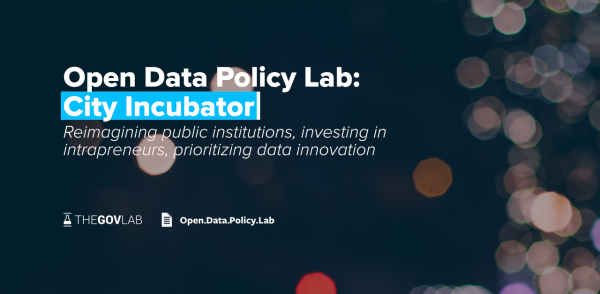
The GovLab: “Hackathons. Data Jams. Dashboards. Mapping, analyzing, and releasing open data. These are some of the essential first steps in building a data-driven culture in government. Yet, it’s not always easy to get data projects such as these off the ground. Governments often work in difficult situations under constrained resources. They have to manage various stakeholders and constituencies who have to be sold on the value that data can generate in their daily work.
Through the Open Data Policy Lab, The GovLab and Microsoft are providing various resources — such as the Data Stewards Academy, and the Third Wave of Open Data Toolkit — to support this goal. Still, we recognize that more tailored guidance is needed so cities can build new sustainable data infrastructure and launch projects that meet their policy goals.
Today, we’re providing that resource in the form of the Open Data Policy Lab’s City Incubator. A first-of-its-kind program to support data innovations in cities’ success and scale, the City Incubator will give 10 city officials access to the hands-on training and access to mentors to take their ideas to the next level. It will enable cutting edge work on various urban challenges and empower officials to create data collaboratives, data-sharing agreements, and other systems. This work is supported by Microsoft, Mastercard City Possible, Luminate, NYU CUSP and the Public Sector Network.
Our team is launching a call for ten city government intrapreneurs from around the world working on data-driven projects to apply to the City Incubator. Over the course of six months, participants will use start-up innovation and public sector program solving frameworks to develop and launch new data innovations. They will also receive support from a council of mentors from around the world.
Applications are due August 31, with an early application deadline of August 6 for applicants looking for feedback. Applicants are expected to present their idea and include information on the value their proposal will generate, the resources it will use, the partners it will involve, and the risks it might entail alongside other information in the form of a Data Innovation Canvas. Additional information can be found on the website here.”